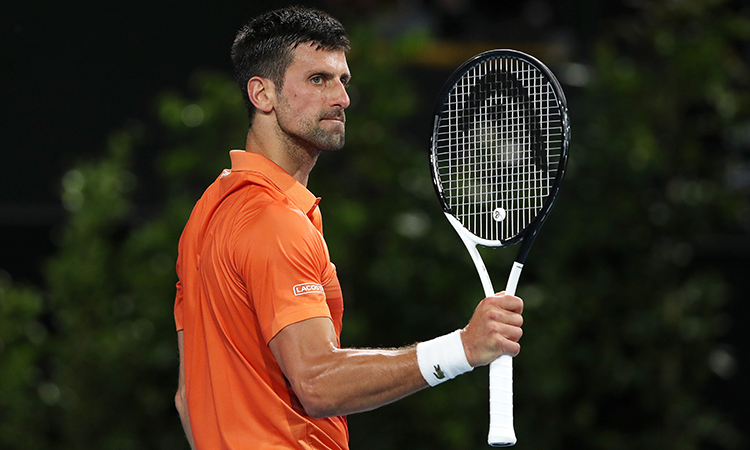Winning ugly is a test of any champion’s ability to pull through even on their off day but it hardly comes as a ploy of preference.
Not necessarily for Novak Djokovic.
The top seed won through to his 131st career final on Friday night at third seed Daniil Medvedev’s expense for his ninth straight defeat of a top-10 rival.
Fortunately for his opponent in Sunday’s Adelaide International men’s singles final, Sebastian Korda, he is under no threat of becoming his 10th by virtue alone of being the world No.33.
Djokovic understood exactly what the 22-year-old American brought to the table despite the pair having never clashed.
“He’s one of the players that has kind of the cleanest striking technique that you can see on the tour,” Djokovic said. “I mean, he’s so talented. Everything seems… just effortless.
“The way he plays, the way he moves on the court, just beautiful-looking tennis. Going to try to make it ugly tomorrow.”
Truth be told, Djokovic has not had to win ugly much all week in his attempt to collect the trophy in Adelaide for the first time since 2007.
He defeated Medvedev and seventh seed Denis Shapovalov by an identical 6-3, 6-4 scoreline.
His greatest scares arguably came with a tweaked hamstring against Medvedev and two tiebreak sets against Frenchman Quentin Halys in the second round.
“As the tournament progresses, every match I play better,” he said. “That’s something that obviously is something I wish for, something I work for, hope for.
“I’m hitting the ball very well. I obviously played a couple matches. Tomorrow we’re going to have a late day session, still some sun on the court, so different conditions.
“Plays differently in the night. Ball bounces less and it’s a bit slower. Obviously it helps when you’re playing big servers, you can return their serve better.”
Korda benefitted from Japan’s Yoshihito Nishioka’s retirement from a hip injury at 7-6(5), 1-0 in the semifinals but had already seen off Andy Murray, Roberto Bautista Agut and sixth seed Jannik Sinner in succession without dropping a set.
Finding a way past a player who has not lost on Australian soil in his past 33 matches was the ultimate challenge.
“I think to get over that finish line, I think he is so good, if plan A isn’t working, he goes to plan B, plan C, plan D,” Korda said. “He has all these different tactics he can use against you.
“He reads his opponents probably the best that anyone can read. I think it takes a big game to beat him. I think I have that type of style. Just try to go into him and try to come out on top.”
Sabalenka, Noskova face off for women’s title
Two gifted shotmakers with polar opposite competitive expressions of emotion duel for the first time in the women’s final when second seed Aryna Sabalenka and surprise Czech teenager Linda Noskova meet.
While fifth-ranked Sabalenka had a momentary wobble clawing her way past Liudmila Samsonova in the first round, it has been largely smooth sailing navigating routes past former Roland Garros finalist Marketa Vondrousova and Irina-Camelia Begu.
The 24-year-old wore her heart on her sleeve in the heat of battle but said she had worked hard to better maintain her composure regardless of the match situation.
“I think I’m trying to work on it – especially this week – if I can stay really calm on court no matter what,” Sabalenka said. “Just don’t get super, super crazy about winning, just do your thing. I think this is the key for me. This week I was trying to work on it. I think I’m doing really well.”
Having been ranked as high as world No.2 early last year, Sabalenka suffered a serious bout of the serving yips that extended beyond the Australian summer swing.
It was not until the season-ending WTA Finals in which she beat the world’s top 3 – Iga Swiatek, Ons Jabeur and Jessica Pegula – before falling to Caroline Garcia that she returned to her best.
“The thing that I understand is nothing can guarantee you winning a tournament,” Sabalenka said. “Helping me a lot to [not] have all these expectations, you know? That’s why probably I’m able to stay calm on court and just work through whatever.”
Her opponent in Sunday’s final has endured a far less routine passage to her first tour final.
Among her six straight wins, the 18-year-old saved a match in the first round of qualifying against Anna Kalinskaya, beat Daria Kasatkina for her first top-10 victim in the first round, saved another match point against former world No.1 Victoria Azarenka and knocked out the top seed Ons Jabeur in the semifinals.
Noskova comes as quite the juxtaposition to Sabalenka, even admitting her lack of outward-showing emotion is often questioned.
“It helped me through a lot of matches that seemed really not good… Yeah, that’s an advantage of mine,” Noskova said.
That was not to suggest she was immune to experiencing many of the same emotions inwardly.
“Oh, I feel it. I feel it a lot,” she said. “I’m just not going to trying to fake it, like, being super, extremely happy or feeling it in the other way, like super disappointed or anything.
“Just trying to win each other point, so that’s all that matters. The past isn’t really as important as the future, obviously.”
